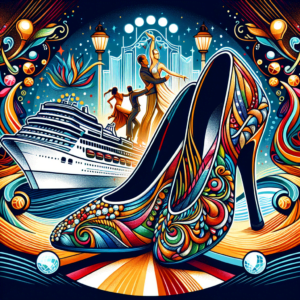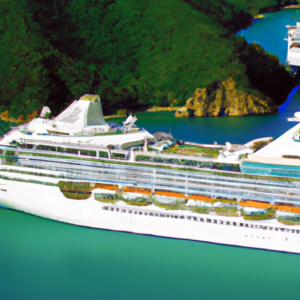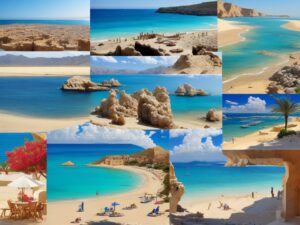Imagine yourself on a magical voyage through Europe, where you can experience the rich tapestry of history unfold before your eyes. From the ancient ruins of Greece to the breathtaking beauty of the Renaissance era, and even the monumental events of the World Wars, this captivating journey will take you on a thrilling adventure through time. Prepare to witness the layers of history come alive as you cruise through Europe and delve into its vibrant and mesmerizing past. Get ready to embark on a journey that will leave you in awe of the incredible stories that have shaped this fascinating continent.
Table of Contents
ToggleCruising Through European History
Ancient Greece
The birthplace of democracy
Ancient Greece is often referred to as the birthplace of democracy, a system of government where power is held by the people. the ancient Greeks established a system of direct democracy in the city-state of Athens, where citizens had the opportunity to participate in decision-making through voting and public assemblies. This revolutionary form of government laid the foundation for modern democratic societies and influenced political systems around the world.
The Hellenistic period
After the conquests of Alexander the Great, the Hellenistic period began, which saw the spread of Greek culture and influence throughout the known world. Greek language, art, and philosophy became widespread, merging with local customs and creating a unique blend of cultures. This period witnessed the rise of great Hellenistic cities such as Alexandria, renowned for its libraries and centers of learning. The Hellenistic period not only shaped the ancient world but also laid the groundwork for the development of Western civilization.
The influence of Greek culture on Europe
Greek culture has had a profound impact on Europe. The Greeks made significant contributions to the fields of science, mathematics, medicine, literature, and architecture. Their philosophy, with thinkers like Socrates, Plato, and Aristotle, shaped the way people think and question the world around them. The classical Greek architectural style, characterized by columns and symmetry, has influenced European architecture throughout the centuries. Greek mythology and literature continue to captivate readers, as their timeless stories of gods and heroes resonate with the human experience. The influence of Greek culture on Europe is immeasurable and continues to be felt to this day.
Roman Empire
Expansion of the Roman Empire
The Roman Empire began as a small kingdom in the city of Rome and expanded through military conquest to become one of the greatest empires in history. The Romans conquered vast territories, including parts of Europe, North Africa, and the Middle East. Their highly organized military, efficient administration, and effective infrastructure allowed them to maintain control over such a vast empire. The spread of Roman influence brought stability, improved infrastructure, and cultural assimilation to the regions they conquered.
Roman architecture and engineering
Roman architecture and engineering were truly groundbreaking. They developed techniques such as the arch, vault, and dome, which allowed for the construction of grand and innovative structures. The Colosseum in Rome, with its sophisticated system of arches and columns, stands as a testament to the engineering prowess of the Romans. They also built magnificent aqueducts, roads, and bridges, connecting their empire and facilitating trade and communication. Roman architectural styles have influenced countless buildings throughout history, and their engineering practices laid the foundation for future advancements.
Fall of the Roman Empire
The fall of the Roman Empire in 476 AD marked the end of an era. Various factors contributed to its decline and eventual fall, including internal corruption, economic instability, and invasions by barbarian tribes. The empire had become too large to govern effectively, and its decline resulted in the fragmentation of Europe into numerous smaller kingdoms. Despite its fall, the legacy of the Roman Empire can still be seen today in legal systems, architecture, and the Latin language that influenced the development of Romance languages.
The Middle Ages
Feudalism and the rise of knights
The Middle Ages, also known as the Medieval period, was a time of great political and social change. Feudalism was the dominant political system, with kings granting land to nobles in exchange for their loyalty and military service. Knights, heavily armored warriors on horseback, played a significant role in Medieval society. They were bound by a code of chivalry, which emphasized honor, bravery, and the protection of the weak. The rise of knights brought a new dimension to warfare and influenced the culture and ideals of the time.
Gothic architecture and the rise of cathedrals
Gothic architecture emerged during the Middle Ages, featuring soaring ceilings, flying buttresses, and intricate stone carvings. Cathedrals, such as Notre-Dame de Paris and Chartres Cathedral, became the pinnacle of Gothic architecture. These grand structures served as centers of worship, demonstrating the power and influence of the Church. The construction of cathedrals was not only a feat of architectural engineering but also a testament to the faith of the Medieval people.
The Black Death
One of the most devastating events of the Middle Ages was the Black Death, a pandemic that swept through Europe in the 14th century. Spread through fleas on rats, the bubonic plague claimed the lives of millions of people, causing immense social, economic, and cultural upheaval. The Black Death had far-reaching consequences, causing labor shortages, religious upheaval, and a decline in feudalism. It was a turning point in European history, leading to significant changes in society and laying the foundation for the Renaissance.
Renaissance
The revival of art and learning
The Renaissance, meaning “rebirth,” was a period of immense cultural and intellectual growth in Europe. It witnessed a revival of interest in the arts, sciences, and humanities, marking a departure from the strict religious focus of the Middle Ages. Artists and scholars sought inspiration from the art and literature of ancient Greece and Rome, leading to a surge in creativity and innovation. The Renaissance sparked a renewed curiosity about the natural world, human potential, and the search for knowledge.
Prominent Renaissance artists and thinkers
The Renaissance was a golden age for artistic and intellectual achievements. Prominent artists such as Leonardo da Vinci, Michelangelo, and Raphael created masterpieces that continue to captivate the world today. Their works exemplified the ideals of the Renaissance, with a focus on realism, humanism, and the celebration of individual genius. Thinkers like Niccolò Machiavelli, known for his political treatise “The Prince,” and Erasmus, a leading figure in humanist scholarship, had a profound impact on the development of political and philosophical thought during this period.
The impact of the printing press
Perhaps one of the most transformative inventions of the Renaissance was the printing press, invented by Johannes Gutenberg in the mid-15th century. The printing press revolutionized the dissemination of knowledge, making books more affordable and accessible. This innovation fueled the spread of ideas, facilitated the sharing of scientific discoveries, and contributed to the growth of literacy throughout Europe. The printing press played a pivotal role in the advancement of knowledge and laid the groundwork for future intellectual and cultural developments.
Age of Exploration
Voyages of Christopher Columbus
The Age of Exploration marked a period of great maritime exploration and discovery. Christopher Columbus, an Italian navigator, embarked on a series of voyages in the late 15th century, seeking a western route to Asia. Instead, he stumbled upon the Americas, forever changing the course of world history. Columbus’s voyages initiated European contact with the New World and set in motion a wave of colonization and trade, leading to the exchange of goods, ideas, and cultures between Europe and the Americas.
European colonization of the New World
Following Columbus’s arrival in the New World, European powers rushed to establish colonies and exploit the wealth and resources of the Americas. Spain, Portugal, England, France, and the Netherlands competed for dominance and established colonies throughout North and South America. The colonization of the New World had profound consequences, shaping the social, cultural, and economic fabric of both Europe and the Americas. It led to the establishment of vast colonial empires and European dominance on a global scale.
The Columbian Exchange
The Columbian Exchange refers to the widespread exchange of plants, animals, diseases, and cultures between Europe, Africa, and the Americas. It was named after Christopher Columbus, whose voyages initiated this exchange. Europeans brought new crops such as potatoes and tomatoes to the New World, while indigenous people introduced corn and tobacco to Europe. However, the exchange also had devastating consequences, as European diseases decimated indigenous populations in the Americas. The Columbian Exchange forever altered the biodiversity and demographic makeup of both continents.
Enlightenment
Emergence of scientific thinking
During the Enlightenment, there was a shift towards scientific thinking and rationality. Intellectuals began to question traditional beliefs and relied on observation, reason, and experimentation to understand the world. The scientific method, developed by thinkers like Francis Bacon and René Descartes, became a cornerstone of scientific inquiry. This emphasis on empirical evidence laid the foundation for the scientific advancements that would shape the modern world.
Philosophers of the Enlightenment
Enlightenment thinkers such as John Locke, Voltaire, and Jean-Jacques Rousseau played a significant role in shaping the ideas and values of the time. They challenged the authority of monarchies, championed individual freedoms and rights, and advocated for the separation of powers. Their ideas influenced political and social movements, and their writings became the bedrock of democratic ideals and human rights.
The French Revolution
The Enlightenment set the stage for the French Revolution, a period of radical political and social upheaval in France in the late 18th century. Inspired by the ideas of the Enlightenment, the French people revolted against the monarchy and called for liberty, equality, and fraternity. The revolution led to the overthrow of the monarchy, the reign of terror, and ultimately the rise of Napoleon Bonaparte. The French Revolution had a profound impact on European history, spreading revolutionary ideals and influencing future political movements.
Industrial Revolution
Technological advancements and urbanization
The Industrial Revolution, which began in the late 18th century in Britain, marked a shift from agricultural and manual labor to machine-based manufacturing. Technological advancements in areas such as steam power, textiles, and iron production transformed manufacturing processes and led to increased productivity. This period also witnessed rapid urbanization, as people flocked to newly established industrial centers in search of employment.
Social and economic impacts
The Industrial Revolution had profound social and economic implications. The mass production of goods led to significant economic growth and the development of a middle class. However, it also brought about harsh working conditions, urban poverty, and a widening wealth gap. The rise of factory labor and the displacement of traditional industries had far-reaching social consequences, sparking movements for workers’ rights and reforms to address the societal upheaval brought about by industrialization.
The rise of industrial capitalism
The Industrial Revolution paved the way for the rise of industrial capitalism, an economic system characterized by private ownership of businesses and the pursuit of profit. It brought about a shift from agrarian economies to industrial economies, and the growth of factories and corporations led to the concentration of wealth in the hands of a few. The rise of industrial capitalism transformed the economic landscape and laid the foundation for the modern capitalist system that continues to shape the world today.
World War I
Causes and outbreak of the war
World War I, also known as the Great War, was a global conflict that started in 1914. The war was sparked by a complex web of alliances, rivalries, and territorial disputes among European powers. The assassination of Archduke Franz Ferdinand of Austria-Hungary by a Serbian nationalist in June 1914 served as a catalyst. The ensuing chain of events led to the mobilization of armies and the declaration of war. World War I would become one of the deadliest conflicts in history, involving nations from around the world.
Major battles and key events
World War I was characterized by trench warfare and devastating battles that claimed the lives of millions of soldiers. Battles such as the Battle of the Somme, the Battle of Verdun, and the Battle of Passchendaele were fought on the Western Front, resulting in staggering casualties. The war also saw the use of new technologies, including poison gas, tanks, and aircraft, which forever changed the nature of warfare. Key events such as the sinking of the RMS Lusitania and the entry of the United States into the war had significant impacts on the course of the conflict.
Treaty of Versailles and its consequences
The Treaty of Versailles, signed in 1919, marked the official end of World War I. It imposed heavy reparations on Germany, forced changes to its territorial boundaries, and placed blame for the war solely on the German Empire. The treaty’s harsh terms and the economic burden it placed on Germany indirectly contributed to the rise of Adolf Hitler and the outbreak of World War II. The Treaty of Versailles also led to the redrawing of national borders, the collapse of empires, and the establishment of new nations in Europe, setting the stage for future geopolitical tensions.
World War II
Rise of fascist regimes
World War II, which took place from 1939 to 1945, was a global conflict that engulfed the world. The rise of fascist regimes, such as Nazi Germany under Adolf Hitler and Fascist Italy under Benito Mussolini, played a significant role in triggering the war. These totalitarian regimes sought to expand their territories and impose their ideologies through militaristic aggression. Their actions, including the annexation of Austria, the invasion of Poland, and the occupation of France, set the stage for the global conflict that would leave an indelible mark on history.
The Holocaust
One of the darkest chapters in human history, the Holocaust, occurred during World War II. Nazi Germany systematically persecuted and murdered six million Jews, along with millions of other victims, including Romani people, disabled individuals, and political dissidents. The Holocaust stands as a stark reminder of the depths of human cruelty and the dangers of unchecked hatred and discrimination. Its legacy serves as a constant call to combat prejudice and preserve the memory of its victims.
Allied victory and the aftermath
The Allied powers, consisting of the United States, the Soviet Union, Great Britain, and others, ultimately emerged victorious in World War II. The sheer scale of the conflict and the devastation it caused led to a reconfiguration of the global order. The war ended with the unconditional surrender of Germany and Japan, but it left Europe divided between the democratic Western countries and the communist Eastern bloc, marking the beginning of the Cold War. The aftermath of World War II transformed international politics, leading to the establishment of new alliances and the birth of the United Nations.
Post-War Europe
Rebuilding and economic recovery
In the aftermath of World War II, Europe faced a monumental task of rebuilding and recovering from the devastation brought by the conflict. The Marshall Plan, a U.S. initiative, provided substantial financial assistance to Europe, aiding in the reconstruction efforts. Countries like Germany, which had been heavily bombed and defeated, experienced an economic miracle and rebuilt their industries and infrastructure. This period of recovery laid the foundation for the economic prosperity that would follow in the post-war era.
The European Union
The European Union (EU), formed in 1957, aimed to promote peace, stability, and economic cooperation among its member states. Initially composed of six nations, the EU has grown to include 27 member states as of 2021. The EU facilitates the free movement of goods, services, capital, and people across its borders. It has also led to the creation of a single currency, the euro, in many EU countries. The European Union has had a profound impact on the political, economic, and social landscape of Europe, fostering a sense of unity and cooperation among its member states.
Modern challenges and the future of Europe
Modern Europe faces a range of challenges, both internal and external. Issues such as economic inequality, mass migration, nationalism, climate change, and the rise of populism pose significant challenges to the unity and stability of the European Union. However, Europe has a long history of overcoming adversity and finding innovative solutions to complex problems. The future of Europe will depend on its ability to adapt, forge greater cohesion, and address these pressing issues while preserving its rich cultural heritage and democratic values. By drawing on its vibrant history, Europe can navigate the complexities of the modern world and continue to be a beacon of progress and cooperation.





